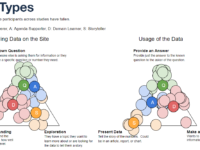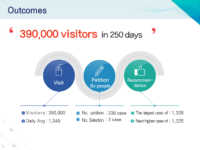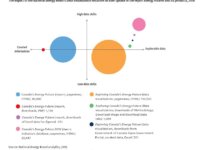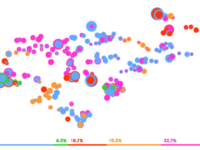In most countries residents are entitled to a number of social benefits, but few people ultimately claim these benefits as they may be unaware of them, of who is eligible, how to apply for them etc. Israel was no different, until recently when Kol Zchut developed www.kolzchut.org.il, which holds over 6,000 information pages, serving more than 6 million unique users annually (>50% of Israelis), dramatically increasing public accessibility to information, and boosting claims to benefits.
Case Studies
Innovations:
0
This website, as well as any data and map included herein, are without prejudice to the status of or sovereignty over any territory, to the delimitation of international frontiers and boundaries and to the name of any territory, city or area.
Previous government-led safety inspection systems were not reflective of social needs and public interest in the foods and drugs that should be on the market.
The new system allows people not only to make policy proposals but to actively participate in food and drug inspections as well.
People are empowered to request inspection or examination of products when there is a growing public concern over the safety of the food or drug in question. The government will respond with an inspection or…
Citizen-centric Municipal Governance Scorecard is an innovation for improving local good governance. The main objective is furthering local good governance through transforming good governance principles into practical, measurable processes and actions. The model consisted of 227 indicators for the seven principles along decision-making, resource allocation, service delivery and institutional capacity stages. The data collection is geared for citizen use, based on digitally available…
Case Study
Redesigning the U.S. Natural Resources Revenue Data (NRRD) portal homepage to meet user needs

The Natural Resources Revenue Data (NRRD) portal provides open data to the public about revenue generated from extraction of natural resources on public lands and waters. Open data provides transparency into government operations, which gives the public information to back up claims made in the name of social justice. To make our data truly open and useful to the public, we’re going beyond our government mandates to open data and including our users in the design process as our site evolves.
In 2016 the NEB launched the Data Visualization Initiative to face the challenge of producing usable and useful data to go beyond using new technologies to deliver better service to citizens. It created multiple products from the same information to expand public participation in the energy dialogue and enable evidence-based decision-making. These products include interactive data visualizations and other materials, such as high school lesson plans, as a new way to engage experts and nonexperts.
Our Court launched a twitter account, seeking to rebuild trust. In Argentina, the justice system is the institution with the lowest public trust. Through this account we publish every judgement, hearings, the staff resumes and the Judge's personal leaves. This is not the norm in our country and constitutes a pioneering innovation that demands deep cultural change from public servants and our users too. We improved engagement with the public and inspire other teams to deliver a more efficient…
In one sentence, the floating Parliament Accounts Committee between Small Pacific Islands State creates a multi-national team of experts who simplifies budget processes while transparently saving resources. A cost-effective measure to share expertise, boost accountability and communicate openly about Governments’ budget processes while providing MPs with the best guidance possible.
Case Study
Partnering for success: a regional monitoring system for social equity and inclusive development
A multistakeholder partnership created a regional indicators-based monitoring system to track pro-poor health policy change across the Southern African Development Community (SADC), a low-income region beset by socio-economic costs of a high disease burden. This stimulated SADC’s Result-Based Regional Monitoring and Evaluation initiative. Extending to all SADC priority areas, Results-Based Monitoring and Evaluation (RBME) enables real-time tracking of regional performance, documentation of…
Make.org est une plateforme européenne de mobilisation citoyenne autour d’actions de transformation de la société. Dans ce cadre, Make.org développe une solution digitale de consultation massive, totalement inédite, capable de faire participer autour d’une question simple d’intérêt général, plusieurs milliers de citoyens, dans plusieurs langues, et de restituer les résultats de cette consultation en ligne, de manière quasi instantanée. Cette solution est complétée des…
Converlens emerged from the Australian government’s 2017/18 Business Research and Innovation Initiative (BRII) "Digitally enabled community engagement in policy and programme design" challenge. The BRII challenge linked into OGP Australia’s first National Action Plan. Deploying artificial intelligence (AI) to provide a smart layer of qualitative natural-language processing techniques (NLP), Converlens assists people in government to excel at managing the submissions and communications…



